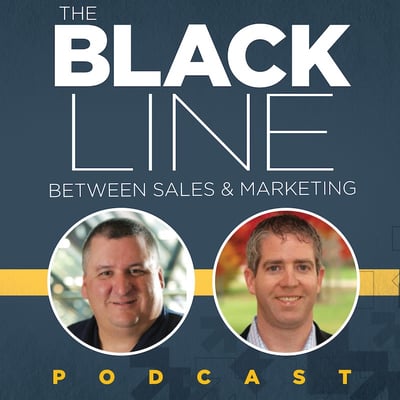Experience, intuition and data have to come together. You don't get a good hypothesis from data. Data can tell you what happened, it's intuition that tells you what data could happen so that you can create a test. In this episode of The Blackline podcast, Mike and Doug discuss their thoughts around Gartner's research - Future of Sales 2025: Why B2B Sales Needs a Digital-First Approach.

Audio:
Show Notes

Doug and Mike start off their discussion by talking about Salesforce buying Slack and how their worth comes from the integrations they've built. Slack's integrations don't compare. For Doug, he doesn't like the fact that Salesforce is buying Slack for a lot of different reasons. He's very deep in the HubSpot ecosystem, and although Slack is going to remain an independent company, he's skeptical of that happening. BUT this isn't the main focus for today's episode. You'll have to tune in to the next one to hear all Mike and Doug's thoughts on the purchase.
BIG NEWS
A few months ago Gartner, the CEB part of it, came out with a report on the future of sales. Their sales content is legitimate, and Doug found this report to be very insightful. But like all things, there are some implications.
One of the biggest frustrations with this piece from both Mike and Doug is that the definitions aren't clear. How are they defining sales? What is the source of the data?
The first piece of data they tack is that the "report predicts that by 2025, 80% of B2B sales interactions between suppliers and buyers will occur in digital channels." Doug's first reaction to this is "duh" and that it's complete BS. Mike has the same take and throws out the question, how are they making the inference? How much is being done in digital channels now? If it's 10%, the jump to 80% is huge, but if it's currently 60%, then it isn't that big of a change.
When you start talking about sales, you have to define what aspect of sales you're talking about. What constitutes as a sale in this case is the foundation that the report is missing.
The next central observation is that "Gartner expects by 2025, 60% of B2B sales organizations will transition from experience and intuition-based selling to data-driven selling, merging their sales processes, applications, data and analytics into a single operational practice." Mike believes this is very hard and unlikely because there's not enough observations or people that can make those inferences. They lose Doug at intuition-based selling to data-driven selling because he doesn't like that term. We talk about hypothesis-driven growth. Data is involved, but you don't create a good hypothesis from just data.
We talk about experience and intuition as if they are bad. The biggest thing is that you need to be careful, be purposeful, and know what you're doing. Best practices in sales is risk aversion, but solely preventing failure does not win the game. If the path to a successful sale was obvious, then it would be easy (and Doug wouldn't exist in his position).
The last data point that is discussed is around millennials, "index percentages by generation report high skepticism of sales rep claims. Baby boomers = 1X, Gen X = 1.4X, Millennials = 2.2X. 44% of millennials prefer no sales rep interaction in a B2B purchase sale."
Mike's take is that the results aren't statistically significant and the response is BS. He thinks 44% prefer bad sales rep interaction and that 100% of all would want no bad sales rep interaction. Doug doesn't disagree with the number, he's surprised it's that low. He disagrees with the conclusion that these numbers infer. What type of purchase is a millennial involved in? They aren't going to be involved in the big enterprise sale. They're involved in more subject matter expertise decisions, like whether they are gong to use Snowflake or someone else.
The more digital the purchase becomes, the less need there is for a salesperson. And as you move deeper into the sales process, design it so that salespeople aren't needed. If they're there, they can be accelerators.
Takeaways:
Mike - The job of the sales rep is to facilitate the complex buying process. He loves the component around hypotheses-based growth, and advises everyone to go read Doug's article: How To Create A Strong Hypothesis. It's a fantastic read for any business professional.
Editor's Note: If you're interested in more content related to hypothesis-driven growth, Episode 59: Interview with Raj Aggarwal & Henry Cipolla - Data, Data Science & Making Better Decisions has a lot of great insight.
Doug - Design your process. You can't control the wind, but you can control the set of your sail. And you better be prepared.
In the next episode, Mike and Doug will be discussing Salesforce buying Slack and will finally answer the question, We're trying to embrace Inbound more, but how do we manage the transition for our sales team?

 Doug Davidoff
Doug Davidoff